Whilst Indonesia remains in the grip of the pandemic, we’re starting to see real results from our two new alliances - Sumatran Rescue Alliance (SRA) and Bornean Orangutan Rescue Alliance (BORA). In the space of just two months, our teams helped rescue eight illegally held orangutans - testament to both a burgeoning problem, and more positively, our growing presence on the ground.
Through our many dedicated ground partners, we’re now in a position to address the interventions needed for orangutan survival, from ongoing patrols, infiltrating poaching networks, complex rescues and confiscations, long term rehabilitation and release, and of course our big endgame - legally securing remaining intact ecosystems, so orangutans can thrive in secure populations for the decades to come.
As always, thank you for helping us create this profound change for Critically Endangered orangutans. I hope you enjoy this snapshot of just some of the vital work you are helping make happen!
As we mentioned in our last update, The Orangutan Project (TOP), Centre for Orangutan Protection (COP) and Orangutan Information Centre (OIC) recently formed the Sumatran Rescue Alliance (SRA) to locate and rescue orangutans in need and to assist Indonesian authorities with the repatriation of illegally held orangutans overseas.
The majority of our new SRA rescue centre has been built and two young female orangutans named Asto and Asih arrived in April. These young orangutans were rescued by our Sumatran Rescue Alliance supporting the local BKSDA (Nature Conservation Agency) in April 2021. They were being held illegally at a house in Semarang on the Indonesian island of Java. After their confiscation and medical checks, they were flown to Sumatra with members of the SRA and then driven to the SRA centre in North Sumatra.
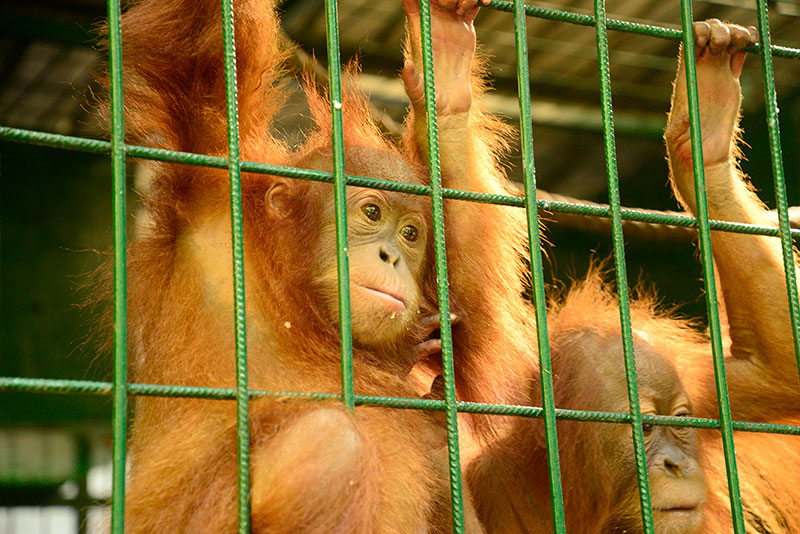
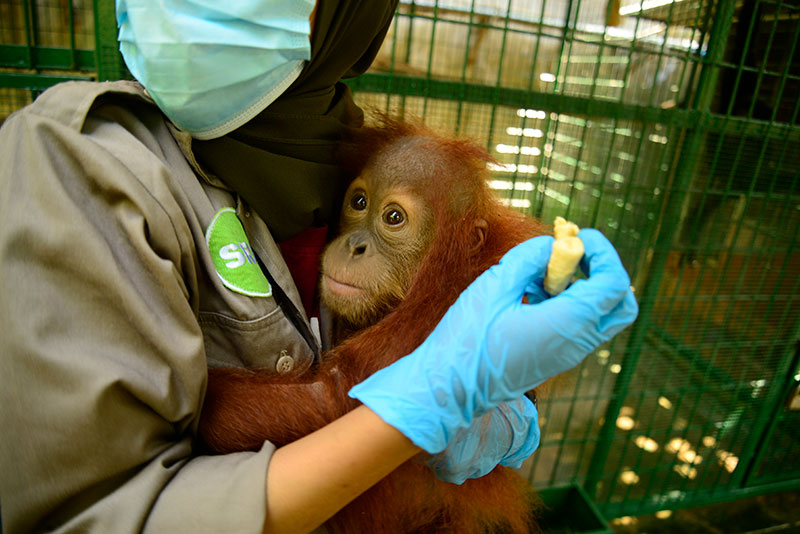
Asto and Asih during the rescue operation
Asto is estimated to be four years old, and Asih two years old. They have commenced Jungle School together in the forested grounds of the SRA rescue centre. They both enjoy playing and climbing in the young trees which is very encouraging for the beginning of their rehabilitation journey. The carers use milk to coax the girls back to them so they can return to the safety of their enclosure overnight.
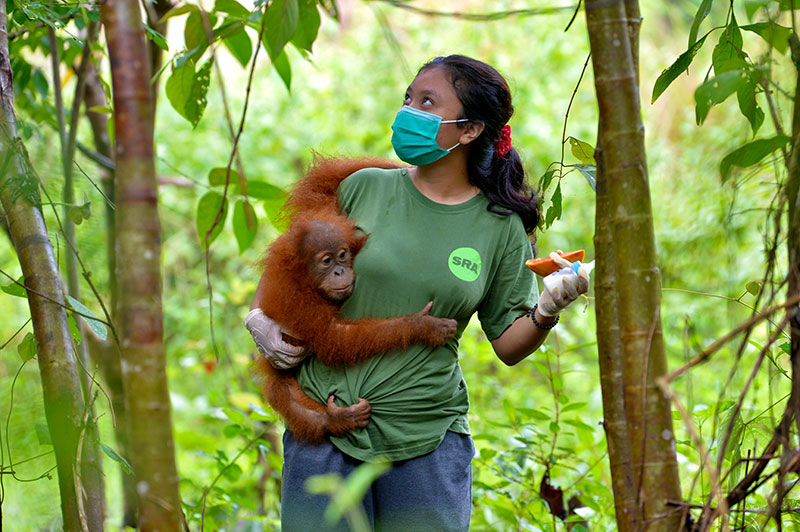
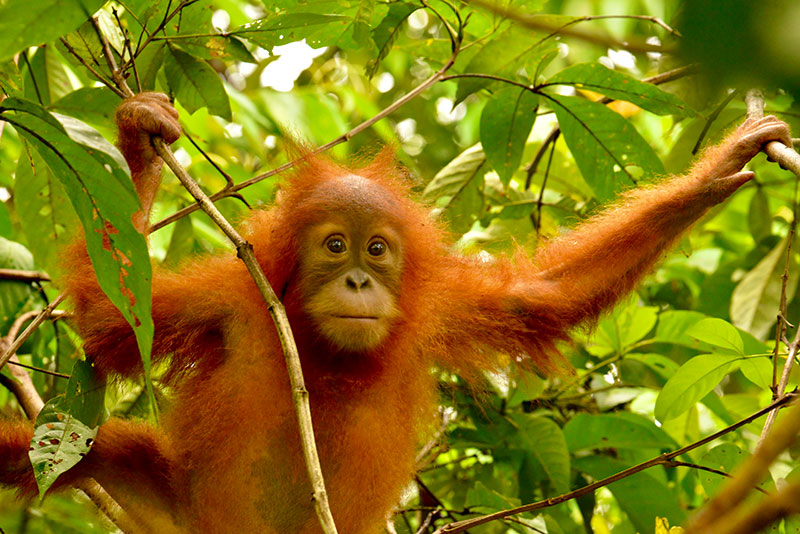
Asto and Asih are now attending regular Jungle School lessons
The Tapanuli orangutan (Pongo tapanuliensis) is the most critically endangered ape in the world, with less than 800 individuals living in the upland forests of the Batang Toru Ecosystem, North Sumatra, Indonesia. They are confined to a range of about 1,100 km2. The area the Tapanuli orangutans inhabit is also home to vital, endemic biodiversity, and is under immediate threat from a proposed large-scale hydroelectric dam. The population is also under threat from encroachment and poaching.
The Orangutan Project has supported a local Indonesian organisation called the Scorpion Foundation since 2016. We purchased a vehicle for Scorpion in 2018 so the Tapanuli orangutan population could be protected through regular joint patrols of Scorpion rangers and government forestry policemen in the Batang Toru Ecosystem. Our specific objectives are:
Each specific objective will be delivered through implementation of four main activities including:
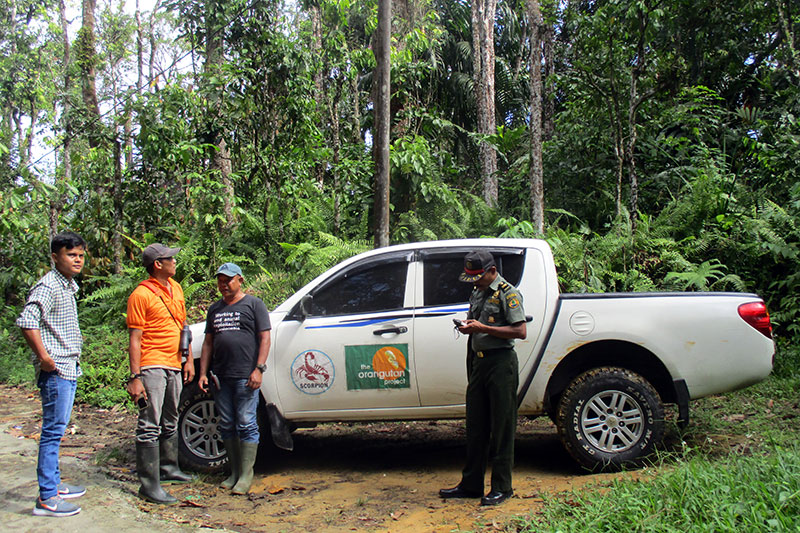
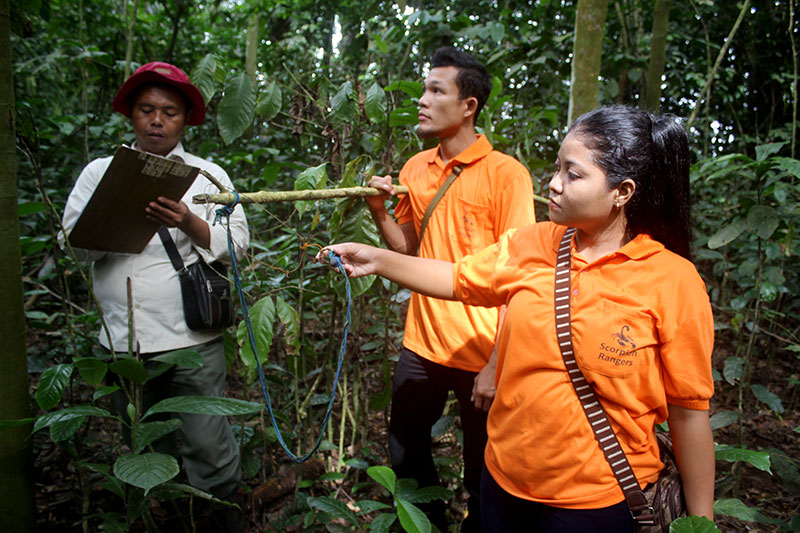
The Scorpion patrol team and vehicle in action
The key objective of this sustainable community development initiative is to improve the living standards of an Indigenous Talang Mamak community by incentivising education through offering nutritious meals to students who attend classes. Increasing the participation rate of children receiving an education and improving the children’s ability to focus on their learning by having a nourishing meal, is a sustainable way to reduce poverty and improve economic growth for the community. The secondary objective of the project is to build a future educated workforce to provide better opportunities of employment for the Talang Mamak community, increasing their potential for earnings and lifting them out of poverty. Employment opportunities will reduce the desire to engage in illegal logging or the illegal wildlife trade, helping to protect Critically Endangered wildlife but also providing a more sustainable future for this impoverished community.
The Talang Mamak are a non-nomadic Indigenous community of about 8,000 people. They live solely in the Bukit Tigapuluh Ecosystem – the last remaining area of large contiguous dry lowland forest in Sumatra, which comprises an extremely rich and unique ecosystem and high biodiversity, including critically endangered Sumatran tigers and orangutans. While mostly a hunting and gathering society, the agricultural activities of the Talang Mamak consists of subsistence swiddens – a low technology form of agriculture with low yields. Due to their low income, some members of the community participate in illegal logging, clearing their traditional village forests for short-term income. Doing so puts at risk the long-term economic sustainability and health of the community, but also contributes to the deforestation of the Bukit Tigapuluh Ecosystem. The priority of the Talang Mamak community is the education of their children but the cost associated with it has been too great.
Funding from The Orangutan Project provides the Talang Mamak school children from 55 households, with a meal and fruit break every day, giving them an incentive to attend and stay at school, improving their health and academic achievement. To undertake this project, two local people from the local community have been recruited to purchase food supplies every week, cook, and provide the food for the children at school. The food provided consists of breakfast, one snack at break time and milk. The food supplies are mostly purchased from local farmers around Simerantihan and Suo Suo villages. Attendance rate and concentration in class has greatly improved since this program commenced.
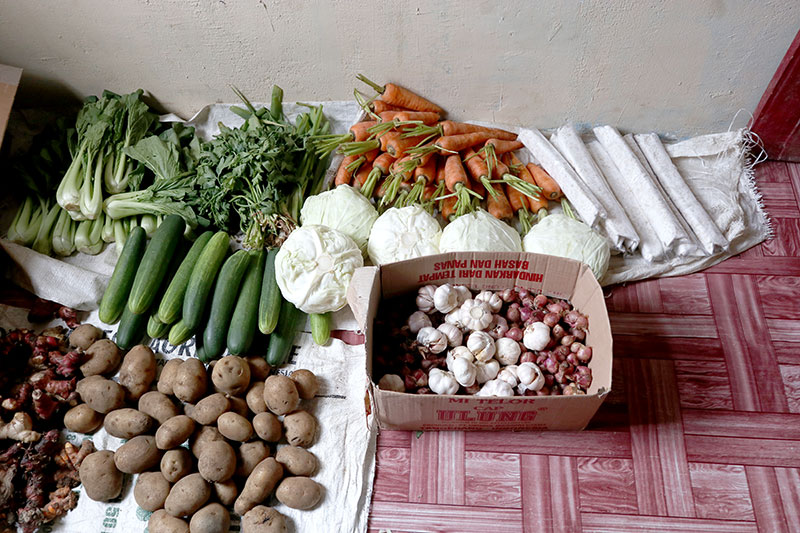
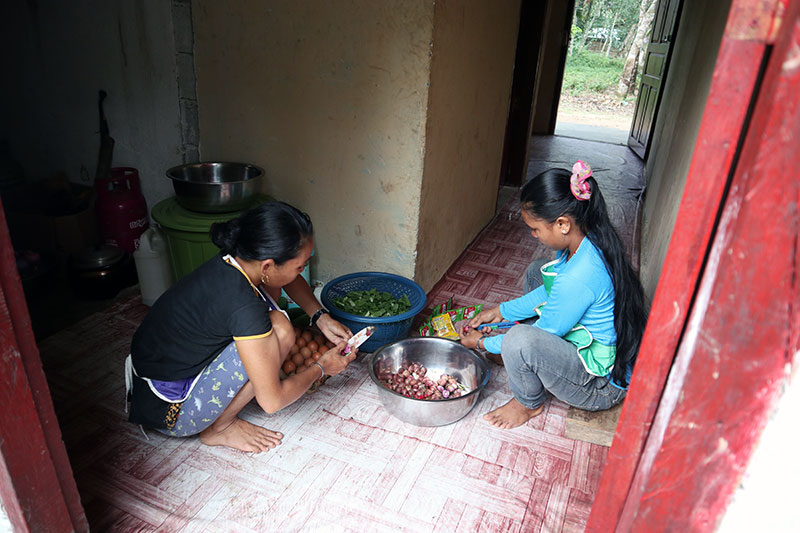
Local food being prepared for the school children
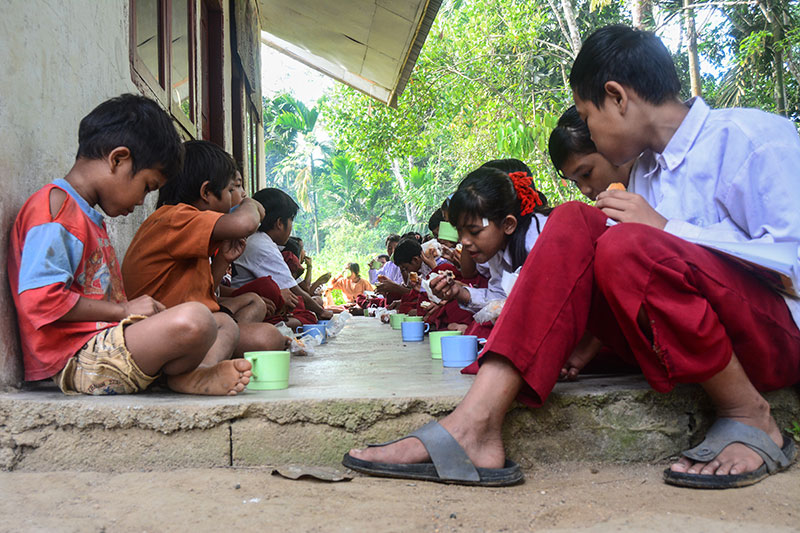
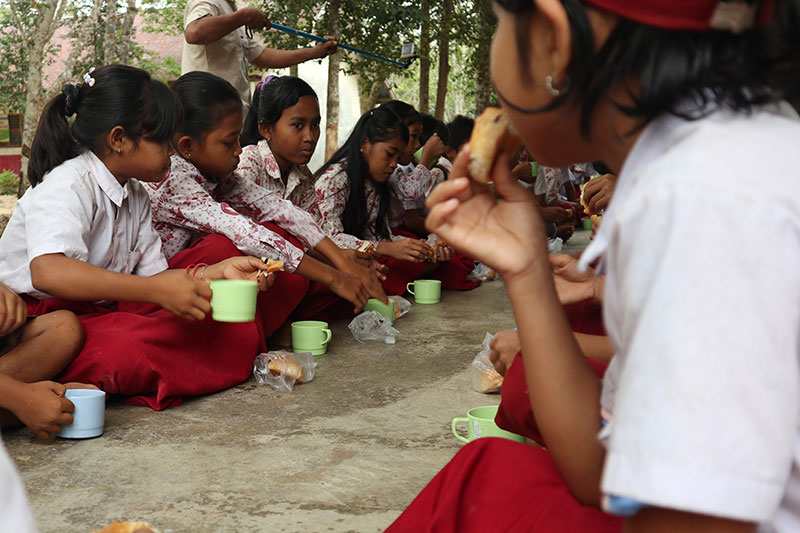
School children enjoying a snack and milk
The Lamandau Wildlife Reserve (LWR) was created from two expired logging concessions in 1998 by the Indonesian Ministry of Forestry, specifically as an orangutan release site. The original surviving population was not viable and consequently a reintroduction programme was initiated. To date, 288 orangutans have been released. The reserve now contains approximately 600 orangutans, about half of whom have been released since 1999. In addition, there have been at least 82 births in the reserve to reintroduced mothers. The reintroduction programme has now created an independently verified self-sustaining viable population, which is listed as a high priority area for orangutan conservation under the most recent Orangutan Population Habitat and Viability Assessment.
Camp Rasak is one of the five release and monitoring sites run by the Orangutan Foundation in the Lamandau Reserve. So far, 35 orangutans have been released there and many of the females have gone on to reproduce and rear offspring successfully. All the orangutans are monitored after both hard and soft releases. Under hard release, Camp Rasak is used for the translocation of adult orangutans that have been rescued from conflict situations in plantations or community land. These orangutans go directly into the surrounding forest. For a soft release, infant orphaned orangutans need constant care from staff to allow them to gradually develop the skills to survive independently in the wild through a long process that takes several years. Camp Rasak is currently home to three soft-release orangutans.
The Orangutan Foundation also runs a Habitat Protection Programme to protect the Lamandau Wildlife Reserve through a patrolling system based on a network of guard posts around the Reserve. One of these, named Post Rasau, is adjacent to Camp Rasak. We have supported Camp Rasak and Post Rasau since 2012. The Orangutan Foundations says, ‘The support of The Orangutan Project is crucial to help safeguard this haven and care for the orangutans being reintroduced back to the wild.’
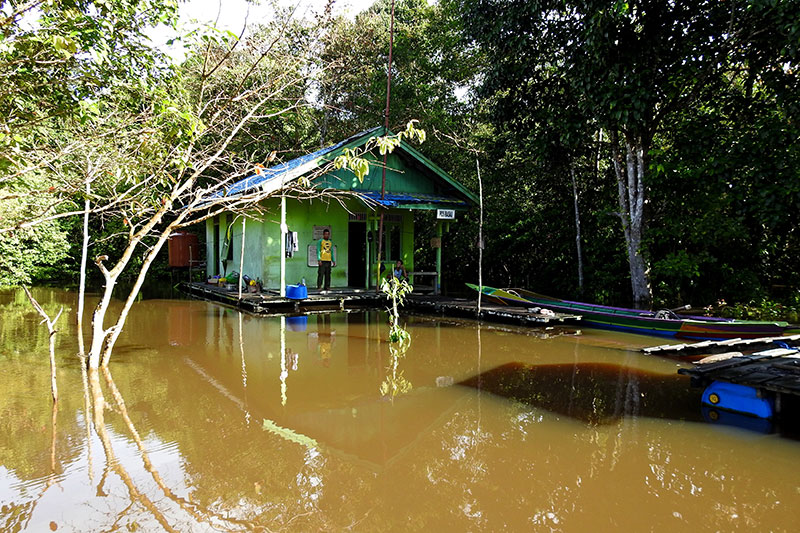
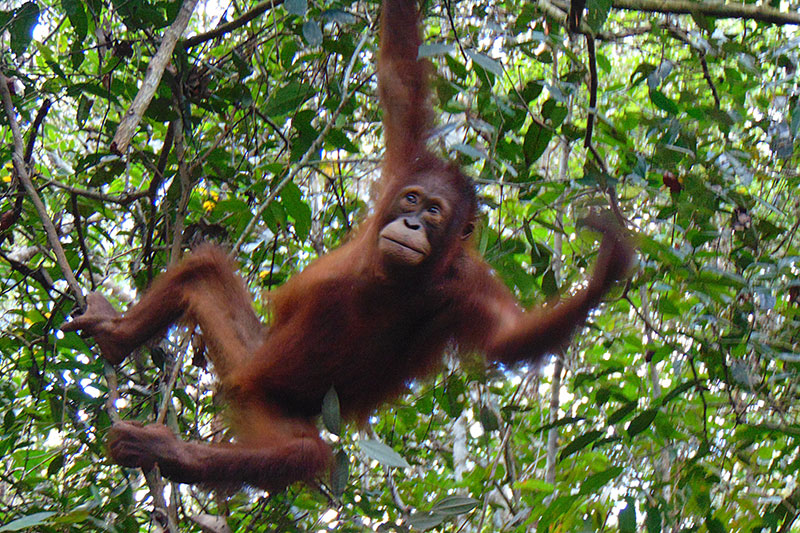
Post Rasau during flooding (lef) and Endut at forest school at Camp Rasak (right)
Thank you again for helping to make this vital work happen for Critically Endangered orangutans.
If you would like to make a donation to support the above activities please click here - and thank you again, we couldn’t achieve this without you.
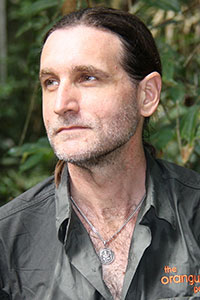 Yours for orangutans,
Yours for orangutans,
Leif Cocks OAM
The Orangutan Project
International Tiger Project
International Elephant Project
Founder
PS. Please click here if you would like to make a donation to The Orangutan Project.
All general donations are tax-deductible in Australia, Canada, UK and the USA.